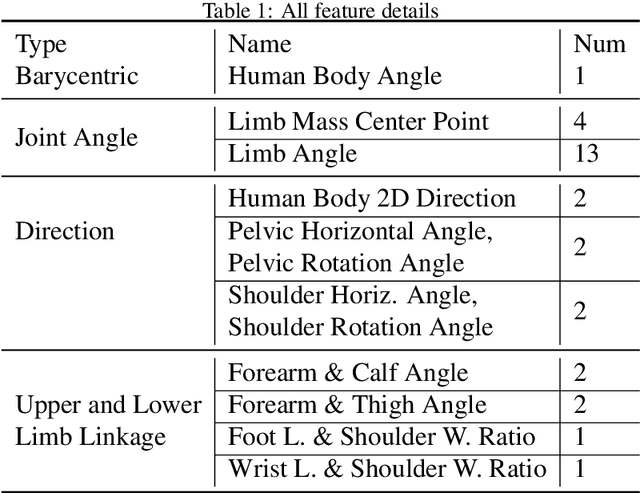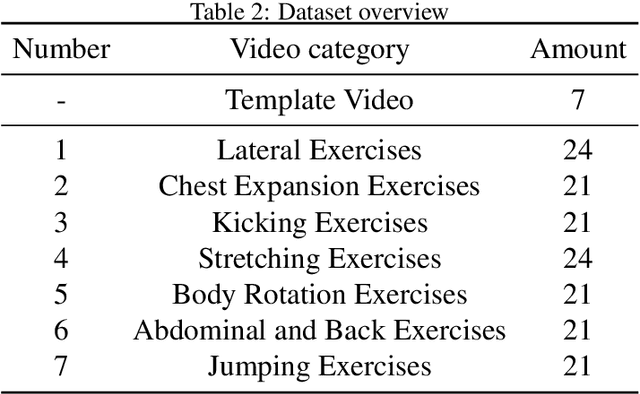Jiwu Shu
Unlabeled Action Quality Assessment Based on Multi-dimensional Adaptive Constrained Dynamic Time Warping
Oct 18, 2024



Abstract:The growing popularity of online sports and exercise necessitates effective methods for evaluating the quality of online exercise executions. Previous action quality assessment methods, which relied on labeled scores from motion videos, exhibited slightly lower accuracy and discriminability. This limitation hindered their rapid application to newly added exercises. To address this problem, this paper presents an unlabeled Multi-Dimensional Exercise Distance Adaptive Constrained Dynamic Time Warping (MED-ACDTW) method for action quality assessment. Our approach uses an athletic version of DTW to compare features from template and test videos, eliminating the need for score labels during training. The result shows that utilizing both 2D and 3D spatial dimensions, along with multiple human body features, improves the accuracy by 2-3% compared to using either 2D or 3D pose estimation alone. Additionally, employing MED for score calculation enhances the precision of frame distance matching, which significantly boosts overall discriminability. The adaptive constraint scheme enhances the discriminability of action quality assessment by approximately 30%. Furthermore, to address the absence of a standardized perspective in sports class evaluations, we introduce a new dataset called BGym.
Toward Reproducing Network Research Results Using Large Language Models
Sep 09, 2023



Abstract:Reproducing research results in the networking community is important for both academia and industry. The current best practice typically resorts to three approaches: (1) looking for publicly available prototypes; (2) contacting the authors to get a private prototype; and (3) manually implementing a prototype following the description of the publication. However, most published network research does not have public prototypes and private prototypes are hard to get. As such, most reproducing efforts are spent on manual implementation based on the publications, which is both time and labor consuming and error-prone. In this paper, we boldly propose reproducing network research results using the emerging large language models (LLMs). In particular, we first prove its feasibility with a small-scale experiment, in which four students with essential networking knowledge each reproduces a different networking system published in prominent conferences and journals by prompt engineering ChatGPT. We report the experiment's observations and lessons and discuss future open research questions of this proposal. This work raises no ethical issue.
Sapphire: Automatic Configuration Recommendation for Distributed Storage Systems
Jul 07, 2020



Abstract:Modern distributed storage systems come with aplethora of configurable parameters that controlmodule behavior and affect system performance. Default settings provided by developers are often suboptimal for specific user cases. Tuning parameters can provide significant performance gains but is a difficult task requiring profound experience and expertise, due to the immense number of configurable parameters, complex inner dependencies and non-linearsystem behaviors. To overcome these difficulties, we propose an automatic simulation-based approach, Sapphire, to recommend optimal configurations by leveraging machine learning and black-box optimization techniques. We evaluate Sapphire on Ceph. Results show that Sapphire significantly boosts Ceph performance to 2.2x compared to the default configuration.
 Add to Chrome
Add to Chrome Add to Firefox
Add to Firefox Add to Edge
Add to Edge